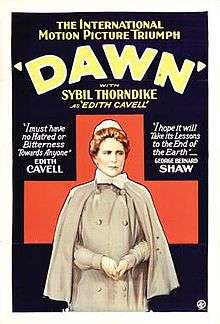Dawn (1928 film)
Dawn is a 1928 British silent war film directed by Herbert Wilcox and starring Sybil Thorndike, Gordon Craig and Marie Ault. It was produced by Wilcox for his British & Dominions Film Corporation. The film was made at Cricklewood Studios with sets designed by Clifford Pember.
| Dawn | |
|---|---|
 Movie poster | |
| Directed by | Herbert Wilcox |
| Produced by | Herbert Wilcox |
| Written by | Reginald Berkeley (play) Robert Cullen Herbert Wilcox |
| Starring | Sybil Thorndike Ada Bodart Gordon Craig Marie Ault |
| Cinematography | Bernard Knowles |
Production company | British & Dominions Film Corporation |
| Distributed by | Woolf & Freedman Film Service |
Release date | 1 March 1928 |
Running time | 90 minutes |
| Country | United Kingdom |
| Language | English |
Based on a play by Reginald Berkeley, this film tells the story of World War I martyr Edith Cavell. Sybil Thorndike stars as Cavell, a nurse who risked her own life by rescuing British Prisoners of War from the Germans. When Cavell was captured and sentenced to be executed, it sparked international outrage, even from neutral nations.
Production
Herbert Wilcox had just made Mumsie (1927), starring Pauline Frederick. Wilcox wanted to make another film with Frederick and suggested Noël Coward's The Vortex but Frederick disliked the role. Wilcox then saw the statue of Edith Cavell in London and decided to make a film of her life.
Frederick was enthusiastic at first but dropped out. Some claimed it was because there was an outcry at the thought of an American playing Cavell.[1] Wilcox claims Frederick was scared off after the German ambassador said that Germany would boycott her films.[2] She was replaced with Sybil Thorndike. Filming proved difficult.
Censorship
One of the most controversial British films of the 1920s, Dawn was censored because of what objectors considered its brutal depiction of warfare and anti-German sentiment. Pressure was exerted by both the German Ambassador and the British Foreign Secretary Austen Chamberlain to prevent the film being passed for exhibition.[3]
Edith Cavell's sister criticised the film saying it would promote hate.[4] However, George Bernard Shaw praised the film.[5] When eventually released, the film was a big success.
Wilcox returned to the subject in 1939 with Nurse Edith Cavell starring Anna Neagle.
Cast
- Sybil Thorndike – Nurse Edith Cavell
- Ada Bodart – Herself
- Gordon Craig – Philippe Bodart
- Marie Ault – Mme. Rappard
- Mickey Brantford – Jacques Rappard
- Mary Brough – Mme. Pitou
- Richard Worth – Jean Pitou – Bargekeeper
- Colin Bell – Widow Deveaux
- Dacia Deane – Mme. Deveaux's Daughter
- Cecil Barry – Col. Schultz
- Frank Perfitt – Gen. von Zauberzweig
- Haddon Mason – German A.P.M.
- Maurice Braddell – British Airman
- Edward O'Neill – Lutheran Priest
- Griffith Humphreys – President of the Court Martial
- Edward Sorley – German Soldier
References
- "Bittiard-Marker Who Became Famous Film Producer". Sunday Times (Perth) (2374). Western Australia. 8 August 1943. p. 7 (THE SUNDAY TIMES MAGAZINE). Retrieved 17 August 2017 – via National Library of Australia.
- Wilcox p 73
- Low p.66-68
- "EDITH CAVELL FILM". The News. X (1, 430) (HOME ed.). Adelaide. 13 February 1928. p. 7. Retrieved 17 August 2017 – via National Library of Australia.
- "GEORGE BERNARD SHAW CALLS PRODUCER OF "DAWN" A FILM POET". The Gundagai Independent (3080). New South Wales, Australia. 9 September 1929. p. 2. Retrieved 17 August 2017 – via National Library of Australia.
Bibliography
- Low, Rachael. History of the British Film, 1918–1929. George Allen & Unwin, 1971.